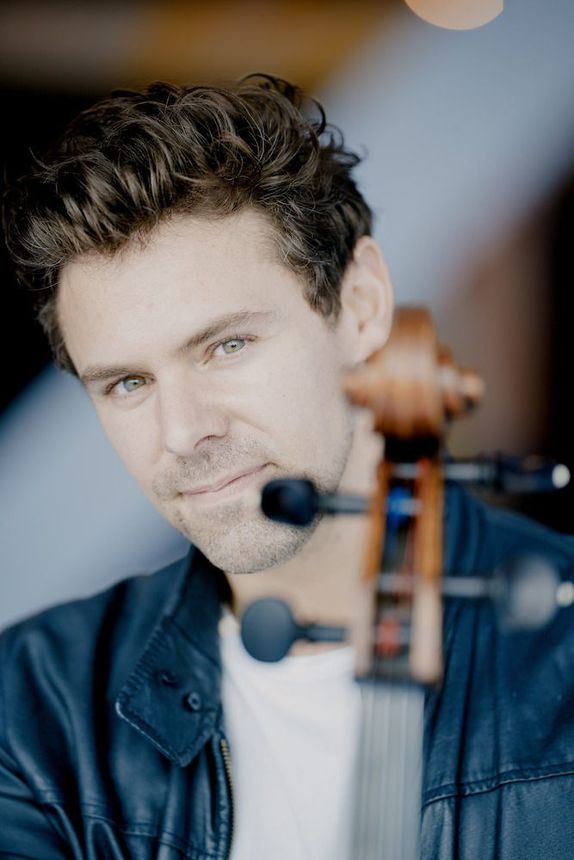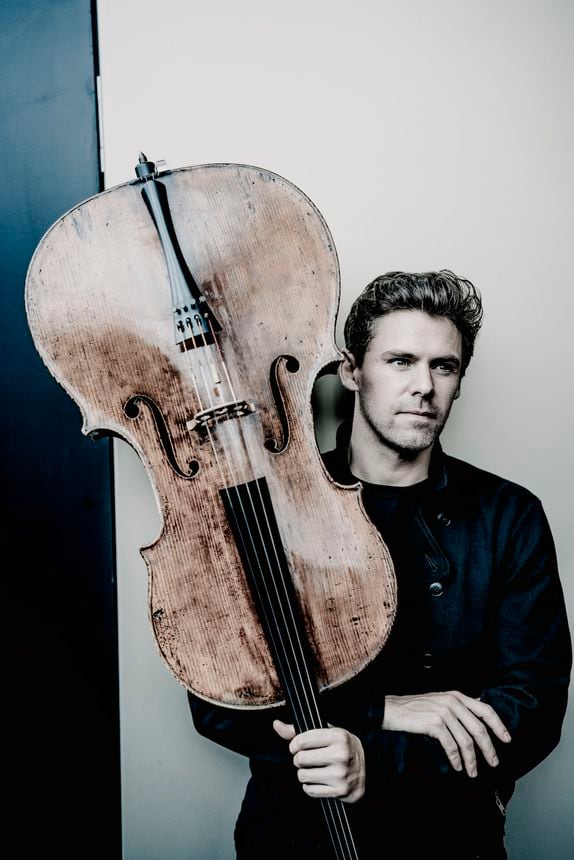We find Christian-Pierre La Marca in the back room of a bar in the Parisian suburbs. On an early morning at the beginning of January, the cold and the rain don’t seem to have dampened the energy of the cellist, who immediately makes us feel at ease with his warm handshake. It is the same kindness that moves him when he starts to share with us the secrets of making Legacy, his new album in collaboration with Julien Chauvin and Le Concert de la Loge, released today by the label Naïve. The programme includes works by Porpora, Haydn and Mozart. “In summary, the main idea of Legacy was to show the evolution of the classical cello tradition, from the beginnings of Italian classicism with Porpora to Viennese classicism with Mozart; and in between, you have these magnificent concertos by Haydn. It’s this idea of connection, of heritage that I find tremendously interesting!”
Haydn, Porpora and Glück… La Marca had never had the chance to record these three composers before. This patient cellist, who doesn’t keep track of how many hours he works, has spent a considerable amount of time on this new challenge: “In terms of Haydn’s Cello Concertos 1 & 2, we’re talking about two pillars of the repertoire. The second one is one of the most requested in competitions, and all these pieces go hand in hand with any cello student… It’s very positive music, very subtle, and at the same time very easy to access, which is what actually makes it complicated, instrumentally speaking. It took me a long time to become aware of that!” It is this humble approach that has led the musician to surround himself with the best performers in the field: “For Haydn’s music, Le Concert de la Loge is something of a benchmark. They had already had the opportunity to revisit almost the entire repertoire, with an incredibly fresh look at symphonic and chamber formats.” These were first-class companions for Christian-Pierre La Marca, who was able to count on them to conduct meticulous historical and aesthetic research: “We are at a crossroads in the history of music here where the cello is no longer an accompanist. It has suddenly become much more than a simple basso continuo–it is given an extremely virtuoso role. It’s the first time that the writing of this instrument was pushed to this level of technicality.” There was always a fundamental desire to ensure that the end product was as authentic as could be: “We recorded at a pitch of 415, I played on a period bow: we really wanted to get as close as possible to the composer’s intentions!”

However, Christian-Pierre La Marca refuses to limit himself to a purely theoretical approach. This would be too academic–he insists that there is another fundamental dimension to his work: “I am obsessed with singing, the way to make the instrument sing. I have a naturally strong relationship with singers, and with the voice in general.” This is a field that the cellist has been involved in for a long time: from his time as a child with the Petits Chanteurs d’Aix-en-Provence choir to his recent collaborations with the sopranos Sabine Devieilhe, Patricia Petibon and the mezzo-soprano Karine Deshayes. “Polyphony, singing with others, was a determining factor for me. And it continues to this day: my playing has to sing. It is the most natural basis for the expression of a melodic line.” When asked about the opera singers who inspire him, the musician mentions Fritz Wunderlich and Philippe Jaroussky, without making any distinction of era. The latter, who is close to Christian-Pierre La Marca, joins him on a track on the album, taken from Porpora’s opera Gli orti esperidi. “When I play with Philippe, or Julien [Chauvin] and Le Concert de la Loge, I feel like I’m at home, with my family.”
He’s quite literally ‘at home’: the cast of Legacy includes the violist Adrien La Marca, Christian-Pierre’s brother, who was invited to share the studio on Mozart’s Sinfonia Concertante K320. At this point in the interview, the cellist’s bright and open expression is filled with gratitude: “There is mutual caring between us - we support each other. Sometimes, when you’re family, the risk is to have no filter, and that can be very destructive. We have found a balance, there’s a very respectful atmosphere between us to remain open to constructive criticism.” It was in this spirit of sharing and togetherness that La Marca crafted his album, starting with the choice of pieces on the programme. The retranscription of the ‘Dance of the Blessed Spirits’ from Orpheus and Eurydice, which is personally meaningful for the musician, is particularly noteworthy: “I was still very young when my family moved to Aix-en-Provence. My father, a conductor, had been hired to conduct a cycle of three operas by Glück, including Orpheus. I was an extra in this production. I don’t remember anything except for that flute solo, which I had found really moving at the time. I was only an observer then. For a child, that kind of experience stays with you for life.” Producing a record is also a love affair for the artist: it is important to put into it what is most dear to them, or rather, in Christian-Pierre’s words, to “personalise the message”.

A messenger, a communicator… these words surely define this generous and humanistic musician. He is as much a messenger in his art, as he is in his civil engagement. Last year, his concept album Wonderful World was the highlight of a long project to raise awareness of environmental issues and biodiversity, with part of the proceeds from sales going to the Good Planet Foundation: “Having children and seeing them grow up in a world that is deteriorating more and more, I wanted to act. I met Yann Arthus-Bertrand, and together we put together a solidarity concert, with documentary images projected live. The idea was to make people understand that our earth is beautiful and needs to be protected - shocking images can certainly make people react, but what makes the most lasting impression is beauty!” This awareness also revolves around the urgent need to rethink the music industry, in particular touring, which is increasingly being criticised for its carbon impact. “There is progress, but we still don’t make enough effort on certain things: we continue to fly entire orchestras to the other side of the world for a single concert. It’s unfortunate, but that’s the way the consumer system works: we like to internationalise. However, if we want to make a real effort… every concert hall has musicians who live nearby and who are very good players! We should encourage local tours, for the public who live in the area–it makes so much more sense!” Though he is clearly a man of conviction, he is still nonetheless a man of nuance and humility: “I am not an ecology specialist; I am a musician: each to their own. I am simply touched by all these subjects. Without being a convert or a preacher, I just want to do what I can.” He concludes by paraphrasing Yann Arthus-Bertrand: ‘Taking action makes you happy.’ Seeing his eyes sparkle as he recalls his memories, we take his word for it.
